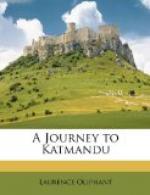Our dinner was always supplied from Jung’s own carpet, for he does not use a table, and it was with no little curiosity that at the end of the first day’s march I looked forward to the productions of a Nepaul cuisine. We had not forgotten to provide ourselves with a sufficient stand-by in case it should not prove altogether palatable. Towards evening an enormous dish, containing rice enough to have satisfied the whole of the gallant rifle corps, was brought into our tent, closely followed by about 20 little cups formed of leaves, one inside the other, each containing about a thimbleful of some exquisite condiment; also three or four saucers containing some cold gravy, of unpleasant colour, in which floated about six minute particles of meat.
Filling my plate with rice, which had been well and carefully greased to improve its flavour, and scientifically mixing the various other ingredients therewith, I unhesitatingly launched a spoonful into my mouth, when I was severely punished for my temerity, and almost overcome by the detestable compound of tastes and smells that at once assailed both nose and palate: it was a pungent, sour, bitter, and particularly greasy mouthful; but what chiefly astonished me, so much as to prevent my swallowing it for some time, was the perfume of Colonel Dhere Shum Shere, the fat brother, which I was immediately sensible of, as overpowering everything else. Not that I would for a moment wish to insinuate that it was a nasty smell; on the contrary, it would have been delicious on a pocket-handkerchief; but to imagine it going down one’s throat, in company with an immense amount of grease and gravy, was nearly enough to prevent its doing so at all.
Our march to Ghazipore was through country richly cultivated and pleasing, if not absolutely pretty. The numerous poppy-plantations were evidence of our proximity to the headquarters of one of the largest opium agencies in India. Ghazipore is approached by an avenue of handsome trees, more ornamental than useful, seeing how utterly destructive it is to the permanent welfare of a road.
The mausoleum, containing a monument to Lord Cornwallis, is solid but not ungraceful: upon one side of the monument are sculptured the figures of a Hindoo and a Mussulman, and on the other a British and a native grenadier, all of whom are weeping. The building is prettily situated near the bank of the Ganges, on a large plain or maidan, across which pleasant avenues lead in all directions; the one which we followed brought us to the stables of the Company’s stud, containing 700 horses. On our way we remarked a number of handsome houses now unoccupied and falling rapidly into decay, the military force at the station having of late been much reduced. The horses were being exercised, notwithstanding which they carried a good deal of superfluous fat, and vented their spirits by occasionally breaking loose, and dashing pell-mell through rings of their companions, who, grudging them




